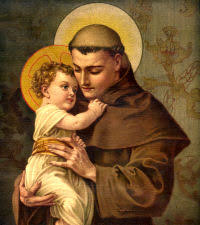HOMILY WEEK 10 02 – Year I
On Being Salt and Light
Memorial of St. Anthony of Padua
(2 Cor 1:18-22; Ps 119; Mt 5:13-16)
**************************************
There’s nothing particularly interesting or special about a container of salt or a package of lightbulbs in your pantry. But think how indispensable they are.
Today’s liturgy invites us to be salt to earth and to let our light shine.
Salt provides flavour to food and can make a bland dish tasty. In ancient times salt was a very valued commodity. Sometimes people were paid in salt, which may be the origin of the word “salary”, and the saying, “He or she is worth his or her salt.” Salt preserves and enhances, and in terms of a metaphor, allows us to add value and depth to life by our positive values and teaching.
It would also be difficult to function anywhere at night without some sort of life. Light dispels darkness and adds warmth, and in terms of a metaphor, symbolizes the elements of compassion and caring we can add to life. The motto for the Christopher Leadership Course is “It is better to light one candle than curse the darkness.” A candle is a wonderful symbol for that course, quietly giving of itself as it lights up a room and overpowers all the darkness around it.
The qualities that salt and light symbolize and call forth are kindness, cheerfulness, thoughtfulness, helpfulness, drawing others to us and to Christ. Reaching out to others with genuine concern and compassion, accompanying others through hard times without expectation, striving to bring greater peace, joy and justice into peoples’ lives are all ways of being salt and light.
Maybe we feel a little like one of these humble household items – nothing out of the ordinary. But each one of us is invaluable; we each have something unique to offer the world. So, in today’s Gospel, when Jesus calls us to be the “salt of the earth” and the “light of the world,” his command is not just for certain people, like the wealthy, the powerful or the saintly. It’s for everyone, including each one of us.
Being like salt and light to other people may sound like a big challenge. But there is a simple place to start: love.
Saint Mother Teresa once said, “Not all of us can do great things, but we can all do small things with great love.” When we visit a lonely neighbor, we are being “salt” by relieving the monotony of his or her day. When we make a child’s favorite meal for his or her birthday, we are bringing “life” into his or her life.
Bishop Barron suggests that we followers of Jesus are meant to be salt, which effectively preserves and enhances what is best in the society around us. We effectively undermine what is dysfunctional in the surrounding culture.
We are also light by which people around us come to see what is worth seeing. By the very quality and integrity of our lives, we shed light, illuminating what is beautiful and revealing what is ugly. The clear implication is that, without vibrant Christians, the world is a much worse place.
But as Jesus reminds us, we do more than just love those who love us back We need to love our “enemies” and forgive those who have wronged us. It could require making peace with a family member with different political views, or forgiving someone who has cheated us out of money. This is the most challenging kind of love, but its’ the kind of love that sets us apart as disciples of Christ – a love so generous that it makes everyone take notice, and we become like a “city on a mountain that cannot be hidden.”
We are part of the Church’s mission to bring Jesus’ love into the world, and we can do it in both every day and extraordinary ways. It’s not always easy, and there’s no guarantee it will be appreciated. But that doesn’t matter. The love we have to offer is as essential to living as salt and light.
Marianne Williamson, in a statement often attributed to Nelson Mandela, who may have used it at his inauguration as president in South Africa, put it this way:
“Our deepest fear is not that we are inadequate. Our deepest fear is that we are powerful beyond measure. You are a child of God. You playing small does not serve the world. There is nothing enlightened about shrinking so that other people won’t feel insecure around you. We are all meant to shine, as children do. We were born to make manifest the glory of God that is within us. It’s not just in some of us; it’s in everyone. And as we let our own light shine, we unconsciously give other people permission to do the same. As we are liberated from our own fear, our presence automatically liberates others.”

St.Anthony of Padua
Today the Church honours St. Anthony of Padua, who was born in Lisbon, Portugal in 1195, although Padua claims him as their own. At 15, he joined the Canons Regular of Saint Augustine and studied intensely for 8 years, becoming an accomplished biblical scholar. He joined the Franciscans and was sent by Francis to teach his fellow friars in northern Italy, Bologna and then Padua. His reputation drew enormous crowds, and the power of his words converted them. Ill and exhausted, he died at age 36, so beloved and revered he was canonized within a year. His aid is invoked to help find lost objects.
The Eucharist makes present the love of God for us shown most profoundly by Jesus’ selfless death on the cross, forgiving those who were crucifying him. May our celebration empower us to do the same – to live out his invitation for us to be salt to the earth and light to the world, like St. Anthony of Padua.



